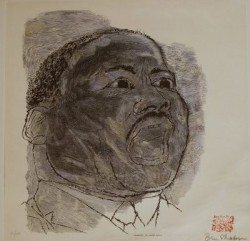Culture & Media
Finding the Dream at the Union Hall

As we settle further into Black History Month, it’s the perfect time to reflect on Martin Luther King Jr. and his often under-acknowledged passion for economic justice. King stands as a pillar of civil rights leadership and the movement for equal rights. His legacy is special to the black community, and as a symbol, he has become an extraordinary role model to all people. However, to see King’s legacy only through this lens would miss much of his work. King was also a union ally and champion of economic justice.
King understood clearly that the battle for racial equality would be empty without a parallel fight for economic equality. “[What] will [the Negro] gain by being permitted to move an integrated neighborhood if he cannot afford to do so because he is unemployed or has a low-paying job with no future?”[i] Having equal rights without the means to exercise those rights becomes an empty promise, a system where lack of access makes equality a mere word. Indeed, racial equality and economic equality (as well as gender equality) cannot exist without each other. King saw the important place that unions occupied in the fight for economic justice. Unions are a place where workers could come together to fight for decent wages, working conditions and quality-of-life issues. In his address to the December 1961 AFL-CIO convention, King told delegates,
“Our needs are identical with labor’s needs: decent wages, fair working conditions, livable housing, old-age security, health and welfare measures, conditions in which families can grow, have education for their children, and respect in the community.”[ii]
Dr. King saw unions as a crucial element of a movement for justice, and to this day our labor leaders continue to pursue his vision of recognizing that economic and racial justice are part of the same struggle. On January, 26, the Construction Careers campaign held a Public Construction 101 event in Inglewood. The room was filled with men and women struggling to find a career to provide for their families. Nearly all were people of color, with a strong contingent of black men and women, yearning for an opportunity. Community members learned how union construction workers physically build the backbone of our communities: our roads, our public transportation, the places we gather and the places where we worship. Union construction work provides workers with benefits that meet their needs, creating stronger families and stronger communities.
In 1961, King argued, “The two most dynamic and cohesive liberal forces in the country are the labor movement and the Negro freedom movement. Together we can be architects of democracy…”[iii] Today, King’s dream for an equal America must be pursued on all fronts. We all must become the “architects of democracy” and help fight for justice for all of our communities.
Ashley K. Thomas is a research/policy analyst with LAANE’s Construction Careers Project.
[i] King Jr., M. L. (2000). The Days to Come. In M. L. King Jr., Why We Can’t Wait (pp. 154-191). New York: Signet Classics.
[ii] King Jr., M. L. (2011). If the Negro Wins, Labor Wins. In M. L. King Jr., All Labor Has Dignity (pp. 31-46). New York: Beacon Press.
[iii] King Jr., M. L. (2011). If the Negro Wins, Labor Wins. In M. L. King Jr., All Labor Has Dignity (pp. 31-46). New York: Beacon Press.

-

 Column - State of InequalityJanuary 22, 2026
Column - State of InequalityJanuary 22, 2026On Eve of Strike, Kaiser Nurses Sound Alarm on Patient Care
-

 The SlickJanuary 20, 2026
The SlickJanuary 20, 2026The Rio Grande Was Once an Inviting River. It’s Now a Militarized Border.
-

 Latest NewsJanuary 21, 2026
Latest NewsJanuary 21, 2026Honduran Grandfather Who Died in ICE Custody Told Family He’d Felt Ill For Weeks
-

 The SlickJanuary 19, 2026
The SlickJanuary 19, 2026Seven Years on, New Mexico Still Hasn’t Codified Governor’s Climate Goals
-

 Latest NewsJanuary 22, 2026
Latest NewsJanuary 22, 2026‘A Fraudulent Scheme’: New Mexico Sues Texas Oil Companies for Walking Away From Their Leaking Wells
-

 The SlickJanuary 23, 2026
The SlickJanuary 23, 2026Yes, the Energy Transition Is Coming. But ‘Probably Not’ in Our Lifetime.
-

 The SlickJanuary 27, 2026
The SlickJanuary 27, 2026The One Big Beautiful Prediction: The Energy Transition Is Still Alive
-

 Column - State of InequalityJanuary 29, 2026
Column - State of InequalityJanuary 29, 2026Are California’s Billionaires Crying Wolf?

